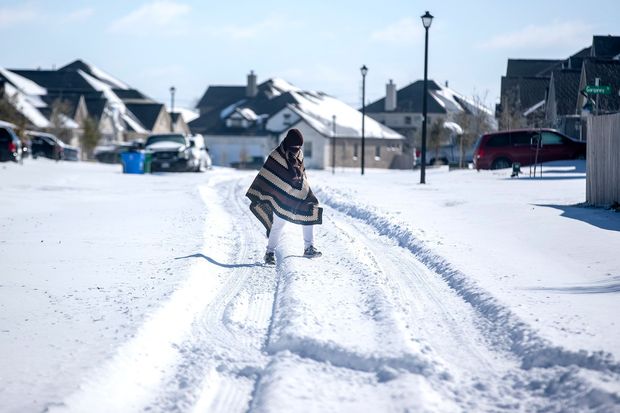Unprecedented, deadly winter storms have battered central and southern parts of the United States. The frigid weather, which started last week, has taken many lives and has left millions without power in Texas, Oklahoma, Arkansas, and other states not used to or prepared for such temperatures. Capitalism is not just responsible for the climate change behind these extreme weather events, it exacerbates the disastrous responses to them.
The storms have shattered temperature records across the South, with some locations seeing temperatures as low as -20°F (-29°C) combined with heavy snowfall. As a result, many power sources have frozen or are overloaded, and 4 million people — mostly in Texas — have lost power, some for more than 24 hours. As of this writing, the death toll from the storm has climbed to 23: several people died from carbon monoxide poisoning or fires, and at least two homeless people died from direct exposure to the freezing temperatures. And the disaster is unfolding in the middle of a pandemic, disrupting coronavirus vaccinations and potentially spoiling thousands of doses.
These extreme weather events, previously once-in-a-lifetime occurrences, are becoming the new normal during an era of accelerating climate change. Increasingly warm temperatures can lead to disturbances in the polar vortex, pushing icy cold temperatures south into Europe and North America. As The New York Times notes, the events of the past week are a glimpse of things to come in the United States and across the world.
You might be interested in: Climate Catastrophe and Socialist Strategy
Capitalism, its exploitation of the environment, and its endless need for growth is the culprit behind climate change. But the millions of people shivering in darkened homes and hundreds who have been hospitalized with monoxide poisoning due to power outages also demonstrate capitalism’s utter failure to respond to these climate disasters or provide the infrastructure necessary to help us withstand them.
Specific power-loss events are most commonly attributable to weather. Hurricanes, tornados, and low temperatures can wreak havoc on power systems. Typically, the problem is the exposure of power lines, which get blown down or collapse under the weight of ice and snow.
In Texas at the moment, the main culprit seems to be frozen instrumentation at coal- and natural gas-fired electricity generation facilities, and at nuclear power plants. That fact, though, hasn’t stopped the capitalists of the big fossil-fuel companies and their mouthpieces (particularly in right-wing media outlets) from spinning a blatantly false tale about frozen windmills — an effort to undo even the minimal shift in the state to renewable sources of energy. The Electric Reliability Council of Texas (ERCOT), which runs the electricity grid in Texas, has put the lie to these claims, reporting that during the crisis wind power generation is actually exceeding daily forecasts. Only a handful of windmills across the state have suffered from the freezing temperatures.
Weather’s the Symptom, Capitalism’s the Disease
But while weather may cause deadly power outages, in the United States it is capitalism that sustains them. The system based on profit and exploitation is as responsible for the situation Texans have been forced into as it is for climate change. It all comes down to how the provision of electricity as a “public good” is organized and financed. For example, consider the problem of exposed power lines. In the United States, only about 25 percent of power lines are underground.
In the U.S. capitalist economy, there is almost no utility planning on a national level. This country has more than 3,300 electric power generation companies that operate more than 7,300 power plants, about 160,000 miles of high-voltage power lines, and millions of low-voltage power lines and distribution transformers that connect nearly 150 million “customers.” The power companies range from giants like Duke Energy in multiple southern states to the 812 not-for-profit member-owned utilities known as cooperatives that have only 24,500 customers. Then there are the even smaller municipal power companies like the one in Boylston, Massachusetts, about 43 miles west of Boston, that serves only its fewer than 5,000 residents. What binds them together are the “Interconnections,” giant grids that aggregate local electricity grids. In the United States, the Eastern Interconnection encompasses the area east of the Rocky Mountains and a portion of Texas; the Western Interconnection encompasses the area from the Rockies West, and includes a bit of Canada and Mexico; and then there’s the rest of Texas.
Most of Texas has its own separate electricity grid, managed by (and known as) ERCOT — a peculiar piece of the “states’ rights” ideology that allows Texan distrust of the federal government to be manifested in such an unusual, far from reliable (despite that word appearing in the grid’s name), and consequently harmful, way. Right now, it is ERCOT that is failing — and killing people. The small part of the state around El Paso that is part of the western grid has power.
The way electric power infrastructure is funded under capitalism exacerbates all the problems. There’s little incentive to spend money on protecting instrumentation from what were once rare weather events. Burying power lines is costly, too, and even more so in areas with shallow top and subsoils, no matter how much reliability it may create. Because public utilities are actually money-making ventures (for the most part; just look at the massive salaries paid to the executives even of municipal systems), they find it less expensive to repair than replace and have little interest in raising the capital required to bury wires. In fact, utilities routinely make the argument before the public service commissions that set their rates that maintaining an underground system is more difficult and thus more expensive because of the reduced accessibility. Of course, this masks the unlikeliness of repairs actually being needed because of catastrophes.
Contrast the U.S. situation with, say, Germany, where nearly three-fourths of medium-voltage cables and nearly 90 percent of low-voltage cables are underground. As a result, Germany’s electricity grid is rated very high for reliability (typically measures in minutes without electricity per year). Germans across the country don’t even notice the 20 minutes or less that a few of them may lose power, whereas the average across the United States is 5 to 9 hours per year. But don’t think that’s because capitalist Germany cares more about the great mass of people who depend on electricity for their daily lives. Having a technologically sensible and resilient grid is something a capitalist country chooses because it serves business interests. Outages — even if they are primarily in people’s homes — waste time and money, disrupt the flow of capitalist production, and are a disincentive to foreign direct investment by capitalists from other countries. Like with so many things, U.S. capitalism seems happy to lag behind the rest of the advanced economies.
So, while catastrophic weather is a major factor in power outages, under capitalism it is reasonable to ask whether it is the disease or a symptom. And in a system based on maximizing profit, the estimate that putting wires underground costs 10 times more per mile than stringing wires on poles makes a compelling argument among the capitalist class — even if that figure is inflated to make a financial case, not one that serves the public interest.
The extreme weather this past week is clear evidence of the unfolding climate crisis capitalism has created. As even the bourgeois media admits, climate change ensures that these extreme weather events — be they winter storms, flooding, or wildfires — will become more common. But the destructive system that is devastating the planet also prevents us from having infrastructure that helps us withstand these disasters.
If our electric system — generation, transmission, and distribution — were nationalized under workers’ control, prioritizing service, reliability, and the safe and effective conversion from fossil fuels to renewables could become the order of the day, and the pretense of the “public utility” — that under capitalism actually serves those who control the wealth — could become a thing of the past, replaced with what would actually be people’s power.











